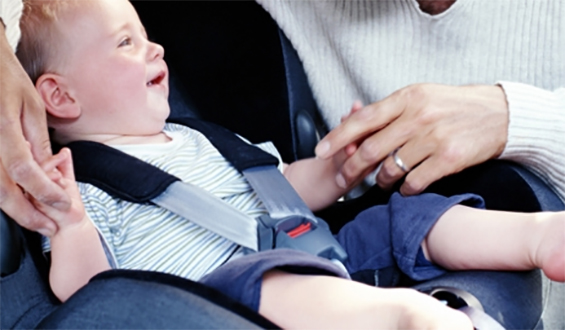
This week is National Child Passenger Safety Week, a good time for parents and caregivers to review the laws and recommendations concerning keeping children safe on the road. There happen to be five mistakes that most parents regularly make when it comes to car seat use, says
Amy Davis of KPRC-TV Houston writes that in the city, three out of every four car seats are not installed correctly. The first thing a parent can do to resolve this problem is to stop by a car seat inspection station. Safe Kids of Greater Houston has 19 locations that do not require appointments. There, safety inspectors will demonstrate how to install the seat and how to buckle your child in safely. It is necessary to bring your child with you in order to get the best hands-on lesson.
Buckling may seem an obvious process, and parents are buckling kids in, but in various incorrect ways.
“People are using latches with seat belts; the harness straps are not tight enough,” said one inspector with Texas Children’s Hospital. “The chest clips are not running high across the chest at the armpits.”
It is important to know that the shoulder strap is not tight enough on your child’s car seat if you can pinch a wrinkle in it.
The next issue is that some parents buy secondhand car seats. This can be dangerous because older seats may be under recall because of safety defects. It is possible to check out any seat online to find any open recalls that may be in place.
There is also the problem of parents not realizing that car seats do have expiration dates. The date is on the seat itself, and that date indicates when parents should stop using it. Seats are usually good for five to seven years from the date of manufacture. Past that time, plastic can begin to wear, which renders the seat unsafe.
And lastly, parents sometimes allow their children to move to the front seat before it is safe to do so. According to the American Academy of Pediatrics, kids should stay in the back seat until they are 13 years-old.
In Texas, the law states that all children who are younger than 8 years-old, unless they are over 4’9″ tall, must be in the appropriate child safety system, which means a booster or a car seat. After 8 years-old, if the child is not yet 4’9″, it is safer to use the appropriate child safety system until they fit properly into an adult safety belt.
Andria Simmons writes in a blog for The Atlanta Journal Constitution that six million car seats were recalled last year due to safety defects, but parents often do not register their car seat. She says she was one of those parents, so Simmons is happy that the National Highway Traffic Safety Administration (NHTSA), in partnership with Safe Kids Worldwide, is using this week to remind parents to register their child’s car seat.
Since car crashes are a leading cause of death for children, she wants to register her child’s car seat to keep up-to-date on the latest recalls. The NHTSA allows parents to register seats online and also links to many of the websites of popular manufacturers. Another site, Parents Central Page at SaferCar.gov, can help parents find the right seat for their child and assist them in finding a certified technician to assure that the seat is installed properly.
Megan Brantley, a reporter for WHNT-TV in Huntsville, Alabama, writes that a study conducted by Safe Kids Worldwide and supported by General Motors asked families how they managed car seat registrations. The findings were that 80% of parents felt it was important to register car seats; 68% knew why car seats should be registered; and only 42% reported that they actually did it.
The CDC reports that having your child in a car seat reduces the risk of death by 71% for infants and 54% for toddlers. Still, these numbers only hold true if the seat is properly set up, reports Devin Turk of WHSV-TV Harrisonburg, Virginia.




